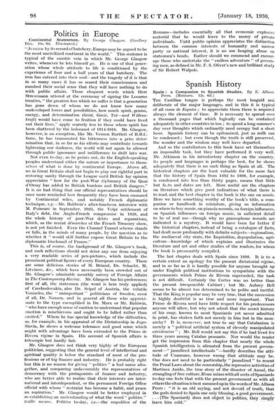Spanish History
Spain : a Companion to Spanish Studies. By E. Allison Peers. (Methuen. 12s. 6d.)
THE Castilian tongue is perhaps the most languid and deliberate of the major languages, and in this it is typical of all cosas de EspaAa ; to appreciate them there is required always the element of time. It is necessary to spread over a thousand pages that which logically can be 'contained adequately in other countries in ten ; to spend a long summer's day over thoughts which ordinarily need occupy but a short hour. Spanish history can be epitomized, just as milk can be condensed ; but even though the truth is still preserved, the wonder and the wisdom may well have departed.
And so the contributors to this book have set themselves an impossible task, but they have performed it very well. Mr. Atkinson in his introductory chapter on the country, its people and languages is perhaps the best, for he shows adequately that there is no such thing as Spain at all. The historical chapters are the least valuable for the mere fact that the history of Spain from 1492 to 1898, for example, is condensed into less than thirty pages, means that little but fats and dates are left. More useful are the chapters on literature which give good indications of what there is to read, and the best chapter in the book is the one on music. Here we have something worthy of the book's title, a com- panion or handbook in miniature, giving us information on where to buy music, on pianola records, on foreign influences, on Spanish influences on foreign music, in sufficient detail to be of real use—though why no gramophone records arc indicated is a mystery. It would have been far better if the historical chapters, instead of being a catalogue of facts, had dealt more profoundly with definite subjects—regionalism, the mediaeval city state, the Inquisition, depopulation, agri- culture—knowledge of which explains and illustrates the literature and art and other studies of the readers, for whom the book is presumably compiled.
The last chapter deals with Spain since 1898. It is to a certain extent an apology for the present dictatorial regime, and in so far as it is hardly possible for anyone brought up under English political institutions to sympathize with the governments which Primo de Rivera superseded, the task is not difficult. Certainly the Cortes was no better than the present irresponsible Cabinet ; but Mr. Aubrey Bell seems to be almost too determined to be polite and tactful. That the King is popular may be very true, that the succession is highly doubtful is as true and more important. That Primo de Rivera need have little respect for his predecessors anyone will allow, but why not admit that the secret history of his coup, known to most Spaniards yet never admitted in print, has shaken faith not merely in him but in the mon- archy? It is, moreover, not true to say that Catalanism is merely a " political artificial system of cleverly manipulated estridencias " ; Mr. Bell would not say this if he had lived for three years among Catalan peasants. Nor would the reader get the impression from this chapter that nearly the whole Spanish intelligentsia is alienated from the present govern- ment—" jaundiced intellectuals "—hardly describes the atti- tude of Unamuno, however wrong that attitude may be. One does not need to be particularly " jaundiced " to resent the Penal Laws about the censorship, the repressive activities of Martinez Anido, the true story of the disaster of Anual, the strangling of free culture. If one mixes with all sorts of Spaniards to-day one feels that with the present government as with all others the situation is best summed up in the words of Mr. Allison Peers : " it is an old saying, and not devoid of truth, that the gods denied to Spain one only blessing, a good government.
. (The Spaniard) does not object to politics, they simply leave him cold."'






































 Previous page
Previous page